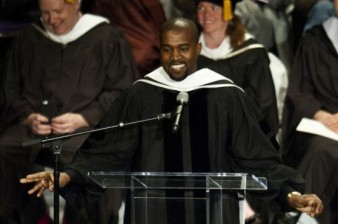
19/05/2015 19:23
Kanye West Isn’t the Problem
Jon Bon Jovi has one. Meryl Streep has four. Even Kermit the Frog has been the recipient of one.
University honorary degrees bring attention to graduation commencements, and often donations to the institutions. They are often awarded to people who have excelled in their chosen fields, but have not taken the traditional steps to achieving them. And the designation “honorary” is intentional — they do not equate to the grueling process that a PhD student must complete before she can call herself “doctor.”
So the criticism being hurled at the School of the Art Institute of Chicago for celebrating rapper Kanye West with an honorary degree last week is peculiar.
West is a Chicago native and a rapper whose first album, College Dropout, was largely a critique of the state of higher education (even though his late mother was a chairwoman at Chicago State University). His voice amplified the many who had matriculated only to discover there was no place for them in it.
In his relatively young career, West has accomplished much, attracting both praise and scorn. He has won thirty-one of the fifty-three Grammy Awards for which he had been nominated. Half of his discography has made Rolling Stone’s 500 Greatest Albums list.
Although one of the top musicians and producers in the industry, he is also never one to hold back his thoughts on controversial issues, most notably when he shocked the nation (and comedian Mike Myers) after Hurricane Katrina by boldly and bluntly questioning a sitting president’s dedication to the lives of black people.
Neither Bon Jovi nor his degree-granting institution received the same level of criticism as West and the Art Institute of Chicago. Some of this opposition can be dismissed as the kind of knee-jerk racism that is lobbed at any black celebrity who exudes confidence. Some of it has been made out of an earnest concern for the institution of higher education.
Rebuking her alma mater, one petitioner wrote:
The holder of an honorary doctorate should embody the values of an institution, and elevate the prestige, dignity and character it represents to its student body, alumni and staff. If SAIC wants to share the honour with a musician, there are an infinite number of more deserving hip hop artists [just for starters] . . . people who value education, creative institutions and the work of their colleagues. Kanye West is not one of these people.
But to say West’s doctorate is insulting — or worse, damaging — to postsecondary education is the reddest of herrings.
If there is an affront to academia, it is not the standard practice of granting honorary degrees — and certainly not to a musical virtuoso like West — but the increasingly abhorrent working conditions for educators, the artificially bloated costs for students, and the overall commodification of the institution.
The trend in higher education now is to hire as many part-time teachers as possible while passing on the savings to no one but university and college administration.
After years of studying, teaching, lecturing, grading papers, taking out students loans, and finally finishing a dissertation, all but the lucky ones are hired to teach for less than a living wage. Some teachers are granted full-time work, but for non-tenure track positions that pay as little as $30,000 with a (real, not honorary) PhD.
And as administrators rake in hundreds of thousands of dollars a year and as pro-austerity governors make dramatic cuts (the governor of Illinois, West’s home state, proposes cutting higher education funding by one-third), the cost of tuition continues to rise at a rate more than double that of inflation. Student loan debt now totals nearly $1.2 trillion nationally.
Under the current system, banks often have more of a say about whether a student can finish school than the student herself. Even after death, financial institutions have families in a chokehold — student loans are one of the few types of debt that aren’t forgiven posthumously.
Corporate, for-profit institutions that prey on people trying to improve their situation through education also diminish the institution. They are founded and run privately, often with non-educators at the helm, and exist only to increase the bottom line. They have a reputation for using dishonest tactics to fill their seats (or virtual seats, in the case of online colleges) and have a terrible record of graduating students. And though they may not be public institutions, up to 90 percent of their revenue comes from federal student aid.
There is some hope. Adjuncts and other non-tenure track instructors are organizing for unions. Graduate student employee unions are using their collective power to bolster broader class projects like support for the $15 minimum wage campaign. And students are acting in concert against tuition hikes and student loan abuses.
But it is this status quo, so injurious to educators and students and so beneficial to corporate interests, that deserves condemnation — not West’s honorary degree.








